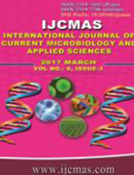


 National Academy of Agricultural Sciences (NAAS)
National Academy of Agricultural Sciences (NAAS)

|
PRINT ISSN : 2319-7692
Online ISSN : 2319-7706 Issues : 12 per year Publisher : Excellent Publishers Email : editorijcmas@gmail.com / submit@ijcmas.com Editor-in-chief: Dr.M.Prakash Index Copernicus ICV 2018: 95.39 NAAS RATING 2020: 5.38 |
Mechanical ventilation is a life-saving procedure, but it is associated with a high risk of acquiring respiratory infections. Hence to prevent it and initiate empirical antimicrobial therapy, knowledge of microbial profile and their local antimicrobial sensitivity pattern are essential. A prospective analytical study of Endotracheal tube (ETT) aspirates of mechanically ventilated patients in Intensive Care Unit (ICU) was done over a period of six months (Dec2015-May2016). Endotracheal tube aspirates of patients who had been incubated for ≥48hrs were processed by standard methods with the aim to identify the microbiological profile of ETT aspirates and their antibiogram. Out of the 47 samples, 72.3% were culture positive. Gram negative enteric aerobic bacteria were isolated from most of the patients, most common being Klebsiella species (32.35%), followed by Acinetobacter and Pseudomonas. Most of the Gram negative isolates were sensitive to Meropenem, Tigecycline, and Polymixin B but resistant to Penicillin derivatives and Cephalosporins. Gram positive cocci were mostly sensitive to Penicillin derivatives, Vancomycin and Clindamycin. Gram negative organisms are predominant isolates of ETT in our ICU. Hence empirical therapy, based on bacteriological profile and susceptibilities is essential to prevent poor outcomes in incubated patients.
 |
 |
 |
 |
 |